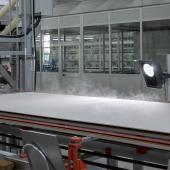Acimac, estimated 29.2% downturn in 2009
The preliminary analysis conducted by the Acimac Studies Centre confirms that 2009 was an annus horribilis for the Italian ceramic and heavy clay machinery manufacturing sector. According to the initial results of surveys, the sector’s turnover fell by around 29.2% (compared to 1,825.5 million euro in 2008).
During the course of the year almost all companies in the sector reported a fall in turnover with the sole exception of those that operate in certain niche markets, such as technologies for optimisation of combustion and energy saving, or are market leaders in the few markets that have been only marginally affected by the global crisis.
The worst hit companies are small businesses with turnovers below 5 million euro, which are still the majority in the sector in numerical terms although they account for just 10% of total turnover. These companies have experienced falls in turnover of more than 32%, in line with the drop in production reported by their client ceramic companies in Italy, where they generate virtually all of their business. For this reason the micro-companies belonging to Acimac are the most pessimistic regarding the outlook for 2010 and anticipate continued difficulties. These are also the companies that have made greatest use of social shock-absorbers and are expecting to continue to use them next year.
Larger companies have reported slightly less negative results. These companies are more active in international markets and are therefore less dependent on the performance of individual markets. For this and other reasons their forecasts for 2010 are cautiously optimistic. Signs of recovery have begun to appear during the last few months of the year and fuel hope that the sector will remain buoyant and that less use will need to be made of social shock-absorbers.
Employment
The employment situation in the ceramic and heavy clay machinery sector appears to be less alarming than the national average in the manufacturing goods sector.
The majority of companies have made limited use of the available social shock-absorbers. On average the wages guarantee fund was adopted for around 3 months and only affected production personnel. The forecasts for 2010 are more cautious, although the majority of surveyed companies confirm that they will not need to resort to the wages guarantee fund unless market conditions worsen.
This situation is partly a result of the organisational structure of companies in the ceramic machinery sector, which have always had a very lean personnel structure and make significant use of production outsourcing. Although there are no official data, the Acimac Studies Centre believes that for this reason the employment situation is certainly more difficult for its member companies’ suppliers and sub-suppliers.
Forecasts for 2010
The Acimac Studies Centre has confirmed its moderately positive forecasts for 2010. Encouraging if unconfirmed signs are arriving from several foreign markets, particularly North Africa, Turkey and South America, where Brazil – one of the world’s largest manufacturing countries – appears to have resumed growth.
On the other hand the European market is expected to remain highly stagnant and continues to cause serious concern.
Did you find this article useful?
Join the CWW community to receive the most important news from the global ceramic industry every two weeks





















